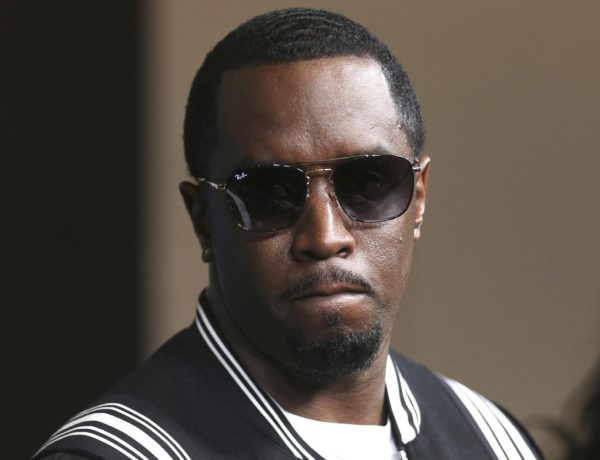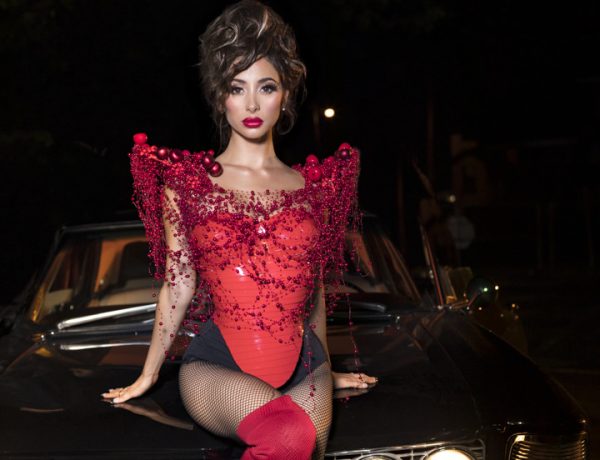Christine Toy Johnson is a busy woman. She can presently be seen in no less than three vastly different projects – Iron Fist, You, and Come from Away. The actress, playwright, and director clearly relishes each of her crafts, approaching every aspect of her work with unparalleled creative insight and reflection. But perhaps Christine’s most cherished role is her advocacy. She remains passionately devoted to cultivating a more diverse Hollywood landscape, a commitment most prominently displayed through her integral part in creating the Asian American Performers Action Coalition, of which she is a founding member. One day, Christine hopes to retire her advocacy hat, a future that seems closer than ever before with the current prominence of Asian-American female protagonists in popular media. For now, she remains enthusiastically focused on telling authentic American narratives…which, she wants to remind you, definitely includes Asian-Americans!
Cliché: You’ve got so many different projects happening right now! Let’s talk about Iron Fist first. Who is Sherry Yang and what motivates her?
Christine Toy Johnson: Sherry Yang is a fierce and powerful woman who fights to protect her family and community at all costs. (Spoiler alert ahead.) She is head of the board at the Bayard Community Center (which is how she and Colleen Wing know each other) and is married to Hai Qing Yang, the head of the Hatchet Triad. She often wishes that the family business would take a different direction, but is nonetheless cognizant and protective of the complicated reasons that have lead them to where they are. And when it becomes clear that she needs to take the reins, her desire to make things right sometimes is at odds with the changing parameters of what “right” means, and the dangers attached to navigating them.
Were you a Marvel fan prior to being cast in Iron Fist?
I actually didn’t know a lot about the Marvel universe before I worked on the show, but my husband has been a big fan since childhood, so he was able to get me up to speed, and now I’m a big fan, of course! I’m especially taken with the number of powerful women characters; they have so much agency, perseverance and fortitude!
You also currently star in Lifetime’s drama You, which follows a man consumed by an obsession with a woman he believes is his true love. Are you intrigued by shows that deal with the darker and more twisted aspects of human psychology?
I’m intrigued by any show that gives us a window into the multiple aspects and levels of a human being’s psyche and You is definitely giving us that! I think it’s such a fascinating show! I’m also intrigued by stories that illuminate our better angels and where they come from…which is definitely what my current project shows us.
Switching gears completely, you’re touring with the critically acclaimed musical Come from Away. Tell us a little about the true story behind the plot for those who might not be familiar.
Come From Away is a gorgeous musical by Irene Sankoff and David Hein that really speaks to the healing power of compassion, especially in the face of tragedy. When the American airspace was closed on 9/11, 7,000 people were diverted to Gander, Newfoundland, on the northeast corner of North America. The people of Gander (and its surrounding towns) opened their hearts and homes to all of these strangers, these “come from aways” for five days, and comforted them with unbridled kindness and incredible generosity. The musical weaves together some of the real life stories that emerged out of that week.
What insights do you think the play (and the real life people in the actual town) provide about human nature?
I think that this show and the real life people that have inspired the show demonstrate (and continue to demonstrate) that if we allow ourselves to be open to it, humanity and kindness can heal, compassion and generosity are more enduring than hatred and bigotry, and love wins. As human beings, we are so much more alike than we are different from one another! We’re all doing the best we can from day to day. And though it’s human nature to be afraid of what’s different from what we know, if we can remember how much we have in common (while still honoring what our differences are), we have a chance at creating real harmony in the world.
Can I also say how much telling this story changes us in the company? We can’t help but be more mindful of our own behavior, making sure our words are kind, necessary and true, making sure we’re being as compassionate as we can be. It’s really remarkable how our better angels are so ready to be present in full force!
How did you feel having the opportunity to return to the stage?
I love being on the stage; it really is my first love. There’s nothing like sharing a theatrical experience with a live audience; these glorious moments of empathy and understanding are collectively created that are unique to each performance! Along with the complete joy of live performing come certain challenges, too. We have to be athletes who can maintain our stamina and wellbeing, both physically and mentally, eight shows a week, week after week, month after month. But it’s totally worth it!
You’re a big advocate of getting Asian American narratives on screen. Why is it so vital that Asian American stories finally get the recognition they deserve?
It’s really important to me that we get Asian American narratives on screen while also portraying/showing Asian American characters that are complex and three-dimensional, just as all human beings are in life! Not only do we deserve to be part of the American landscape of storytelling because we’re a vital part of the American landscape, we also deserve to have a wide variety of our stories being told. Film, theatre and television have this unbelievable opportunity to shift perceptions of who we are and what we can do. The busting of over worn tropes and stereotypes is a huge first step. Then comes telling more and more authentic stories that spring from within our communities so that they are included in the global narrative.
The ripples can be profound. I truly believe that more equal representation of all the different types of people who live and thrive here in America has the ability to provide a wider worldview for all of us, which can lead to fuller compassion for others – and for ourselves, too.
When you start to realize how much you’ve internalized the kind of exclusion that is manifested by our underrepresentation in movies/TV shows/theatrical shows (and/or one-dimensional renderings of Asian American people in what roles there have been), you also realize how much it can shape your perspective on your place in the world. One of the reasons I loved getting to play Sherry Yang in “Iron Fist” is that I’d never been asked to play anyone like her on television before (powerful, elegant, conflicted, and speaking without an accent. I have absolutely nothing against characters that speak with an accent, but if that’s all you see, the perpetual foreigner stereotype that we are constantly battling cannot help but be reinforced, which I’m not in favor of). All of this has helped shift my perspective on the place someone who looks like me can occupy in the world of TV.
The good news is: there’s been a lot of positive change, especially in the past 5 years or so. But we have lots of room to grow!
In terms of representation, we’ve seen a big surge in female Asian-American protagonists in films like Crazy Rich Asians, Set It Up, and To All the Boys I’ve Ever Loved. You’ve been breaking the color barrier in the industry for over 30 years. What does it mean to you to be able to witness Asian American women at the forefront of successful films?
Honestly, I don’t know if I thought I’d ever get to see this day. I told the show runners of Iron Fist that one of the reasons it was so meaningful to me to get to do the show was that I had sort of accepted the idea that I perhaps would only get to play 3-dimensional characters in the theatre, but then they created someone like Sherry Yang and I got to play her in a fantastic TV series with other kick-ass female characters! I loved every minute and have been really moved by the response.
I loved Crazy Rich Asians so much for so many reasons (I haven’t had a chance to see the other films you mentioned yet) – including the fantastic array of female characters and the wonderful Asian American actresses playing them. I’m thrilled that so many people are finally recognizing that Asian American women can play so many different kinds of roles, but it’s something we’ve known for a long time! We’ve just needed the “airtime”.
In your mind, what’s the next step that we can take towards diversifying roles for Asian-American actors? To diversifying Hollywood in general?
One of the biggest fallacies I’m always trying to dispel is the assumption that we don’t have enough Asian American roles/stories because we don’t have enough Asian American writers. But this is not the case! We are writing and writing and writing – but we are not always getting produced. Part of this, I think, has to do with certain societal (and sometimes subconscious) expectations about what kinds of stories we “should” be writing, as opposed to being open to the kinds of stories that we are compelled to write. For example: personally, I see the world through the lens of a sixth generation Asian American person, and I recognize that this often does not jive with the (aforementioned) perpetual foreigner narrative that has been prevalent in the past. Still, I continue to write what I’m compelled to write and keep trying to find the right spaces for those stories to come to light.
I do think that everything is shifting a bit with the success of Crazy Rich Asians, and I hope it’s not just a temporary wave. So to answer your question: I think we have to get more of our stories produced, the ones that we are compelled to tell. And we have to know that there is an audience that is hungry to experience new and authentic narratives. Also, we can be a part of stories that aren’t specifically about Asian American culture! I know I’m repeating myself, but we’re part of the all American landscape! We can and should be a part of the all American landscape of storytelling!
I also think that the more diverse the leaderships at studios become, the more diverse the writing teams become. With that, more diverse stories are produced, and more diverse casts are called on to populate these stories. All of this is certainly happening more and more.
What words of wisdom do you have for any aspiring Asian-American actresses?
Two of the best pieces of advice I’ve ever gotten are to “go where you’re celebrated, not where you’re tolerated” and to “stop waiting to be invited into the room; we are the room”. To me, these things add up to mean that we need to continue to make our own space, and be proud to occupy it. There are plenty of messages out there to the contrary, but stay the course, do the work, and tell your story! Don’t let anyone tell you how you should be defined. Claim your own definition and let it stay fluid as you continue to grow and flourish. And never underestimate the power of integrity, perseverance, gratitude and kindness in your work and your life.
You’re already an actress, playwright, director, and advocate. Is there any other role that you haven’t tackled yet that you would want to take on?
I truly love all of those roles! But I actually look forward to the day when I can take off my “advocate” hat; when it will no longer be necessary to explain why our stages and screens should be diverse and inclusive and reflect the world as it really is! But in the meantime, I feel extremely fortunate and profoundly grateful to be both a generative and interpretive artist and to fight the good fight. Now, more than ever, we need a wider world view, not a narrower one, and I think the arts can be a beautiful part of making that a reality.
Read more Celebrity Interviews on ClicheMag.com
Christine Toy Johnson Wants You to Join Her In Imagining a Wider World. Photo Credit: Bruce Johnson.





